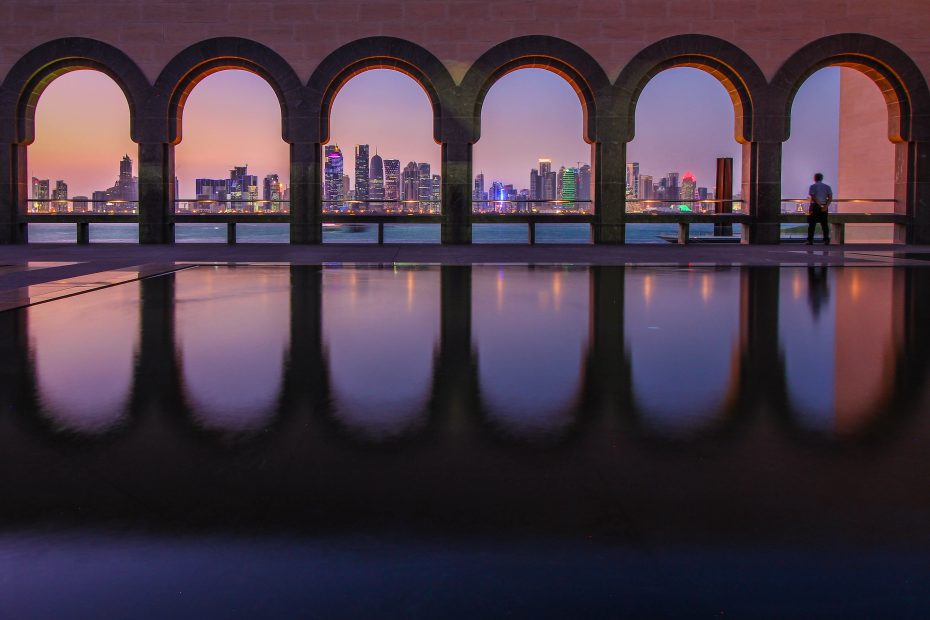Table of Contents
Introduction
Qatar is a small but immensely wealthy country located in the Arabian Gulf. Despite its small size, it boasts of a rich cultural heritage rooted in centuries of tradition. Qatar’s strategic location at the crossroads of Asia, Africa and Europe exposed it to diverse influences over the centuries, shaping its unique culture today. Let’s explore some of the highlights of Qatar’s fabulous cultural extravaganza!
Qatar’s Diverse Population
Qatar has a highly diverse population, with Arabs, South Asians, Iranians, Africans and Europeans calling it home. This melting pot of cultures and ethnicities makes Qatar a vibrant society. The local Qatari population practices centuries-old Bedouin traditions, while expat communities have imported their own languages, food, music, and customs. This diversity is at the heart of Qatar’s cultural richness.
Architecture
Qatar’s architecture brilliantly fuses tradition with modernity. Ancient forts, towers and souqs stand alongside futuristic skyscrapers. Lively markets and museums showcase both Qatari heritage and contemporary art. The bustling Souq Waqif transports you to a bygone era with its mudbrick shops and winding alleys. Modern architectural marvels like the Museum of Islamic Art add to Qatar’s diverse cityscape.
Museums
Qatar has invested heavily in world-class museums celebrating its history and culture. The Museum of Islamic Art has an unrivaled collection of Islamic artworks spanning centuries. Mathaf: Arab Museum of Modern Art shows Qatar’s support for Arab art. The new National Museum of Qatar beautifully depicts the country’s origins and growth. These museums affirm Qatar’s cultural identity and heritage.
Music and Dance
Qatar’s traditional music features complex rhythmic patterns and instruments like the oud. Popular folk dances include the Ardah, involving sung poetry and rhythmic clapping. The country hosts international musicians, while also nurturing local talent. Qatar Philharmonic Orchestra and Qatar Music Academy promote classical music. The annual Wukla Festival showcases traditional Qatari music and dance.
Arts and Crafts
Qatari arts and crafts beautifully blend utility with aesthetics. Intricate jewelry made from gold, silver and pearls adorn locals and are popular souvenirs. Skilled potters create clay pots and decorative items. Knitters produce wool shawls and camel decorations. Weavers turn wool and goat hair into vibrant rugs, tapestries and tents. These intricate handicrafts keep Qatar’s heritage alive.
Cuisine
Qatari cuisine reflects a desert culture of hospitality and community. Staples include rice, flatbreads, meat and seafood. Spices like saffron and cardamom add distinct flavor. Machboos, a spiced rice and meat dish, is the national favorite. Sweet options like luqaimat dumplings satisfy cravings post-feasting. The Bedouin tradition of coffee and dates persists in Qatar’s food culture.
Sports
Qatar’s sports scene celebrates its cultural traditions. Falconry, a treasured Bedouin pastime, is practiced with passion. Annual racing events like the Kings Cup highlight prized falcons’ hunting prowess. Camel racing is another popular traditional sport, seen at festivals like the Camel Race Track Championship. Football is Qatar’s most popular modern sport. The country will make history hosting the FIFA World Cup 2022.
Annual Cultural Festivals
Qatar hosts exciting cultural festivals showcasing its heritage. The annual Doha Cultural Festival highlights Qatari arts, food, music and sports over two weeks. Eid festivities, Ramadan traditions and Qatar National Day celebrations feature cultural experiences. Regattas, food carnivals, film and comedy festivals add to Qatar’s packed cultural calendar year-round.
Religious Diversity
Qatar allows religious freedom, reflected in its places of worship. Elegant mosques co-exist with churches, Hindu temples and other shrines. State-of-the-art mosques include the Sheikh Zayed Grand Mosque and the Abdullah bin Zaid Al Mahmoud Mosque. Churches like Our Lady of the Rosary and Shoba John Kuriakose Church serve Christian expats. The Sri Mariamman Temple caters to Hindu worshippers.
Conclusion
From skyscrapers and souqs to museums and mosques, Qatar offers an incredible diversity of cultural experiences. Its preserved heritage and cosmopolitan atmosphere make it a dynamic melting pot. By investing in culture and sports, Qatar continues to nurture its unique national identity while embracing globalism. Its living heritage remains the bedrock of Qatari society, even as the country races towards an ambitious future. For visitors and locals alike, Qatar promises a fabulous cultural extravaganza.
FAQ 1: What types of traditional architecture can be found in Qatar?
Some examples of traditional Qatari architecture include ancient forts and towers, souqs (markets), old palaces, and vernacular barasti (palm frond) homes of pearl divers and Bedouins. The restored Souq Waqif in Doha allows visitors to experience a historic marketplace.
FAQ 2: What are some major cultural festivals held in Qatar?
Major cultural festivals in Qatar include the annual Doha Cultural Festival, Eid celebrations, Qatar National Day, Qatar International Food Festival, Ajyal Film Festival, Qatar Summer Festival, and shopping festivals like Doha Jewellery & Watches Exhibition.
FAQ 3: What kinds of museums are popular in Qatar?
Some of Qatar’s most renowned museums are the Museum of Islamic Art, Mathaf: Arab Museum of Modern Art, Sheikh Faisal Bin Qassim Al Thani Museum, National Museum of Qatar, and the upcoming Qatar Auto Museum. There are also museums focused on natural history, sports, and Qatari heritage.
FAQ 4: What are some traditional Qatari dishes and foods?
Popular Qatari dishes include machboos (spiced rice and meat), madrouba (sweet vermicelli), khobz (flatbread), balalet (sweet vermicelli dessert), karak (spiced tea), and fresh dates. Traditional foods utilize meat, rice, dairy products, spices, and seasonal produce.
FAQ 5: How does Qatar promote its cultural heritage and identity?
Qatar promotes its cultural heritage by investing in museums, cultural festivals, arts, sports, architecture, education programs, and restoring historic sites. Initiatives like Qatar National Vision 2030 aim to balance modernization with preserving Qatari culture and identity.
